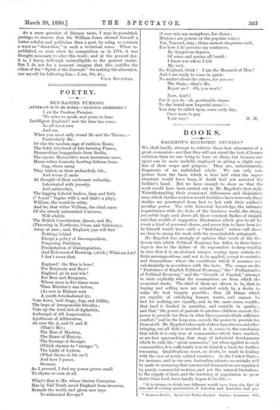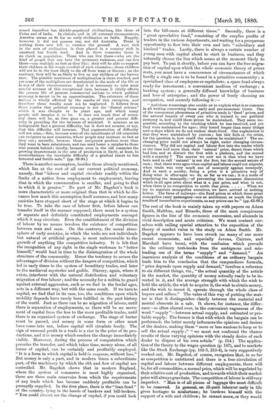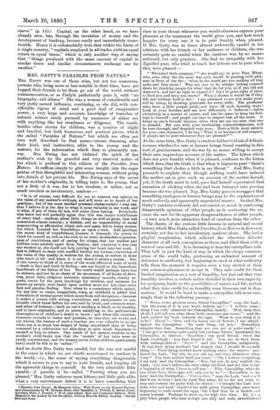BOOKS.
BAGEHOT'S ECONOMIC STUDIES.* WE shall hardly attempt to criticise these last utterances of a great economist—not that they will not stand the test of keener criticism than we can bring to bear on them, but because our space can be more usefully employed in giving a slight out- line of their scope and purpose. They are, unfortunately, fragments of an unfinished whole. We can only con- jecture from the basis which is here laid what the super- structure would have been, if death had not arrested the builder's band. But we have enough to show us that the work would have been carried out in Mr. Bagehot's best style.
Notwithstanding their occasional diffuseness and disjointed- ness, which further revision would doubtless have removed, these studies are penetrated from first to last with their author's peculiar power. The wide historical knowledge, the intimate acquaintance with the facts of the business world, the strong yet subtle logic, and above all, those constant flashes of insight and that wealth of suggestive illustration which give to all he wrote a kind of personal charm, and prove him to have been (as he himself would have said) a " first-hand " writer—all these are here to stamp the work with his unmistakable autograph.
Mr. Bagehot was strongly of opinion that much of the dis- favour into which Political Economy has fallen in these latter days is due to the failure of its expounders to keep steadily in view that it is an abstract science, resting upon certain de- finite presuppositions, and not to be applied, except to societies and transactions where the conditions which it assumes are substantially in accordance with the facts. The essays on the "Postulates of English Political Economy," the" Preliminaries of Political Economy," and the " Growth of Capital," attempt to state explicitly what the assumptions are from which tho economist starts. The chief of them are shown to be, that in buying and selling men are actuated solely by a desire to make the best bargain possible ; that all things which are capable of satisfying human wants, and cannot be had for nothing, are equally, and in the same sense, wealth ; that land is limited in quantity, and variable in quality ; and that "the power of parents to produce children exceeds the power to provide for them in what those parents think sufficient comfort," and in the long-run, exceeds the power to provide for them at all. Mr. Baoehot takes each of these hypotheses, and after bringing out all that is involved in it, comes to the conclusion that while it is only true of communities which have reached, or are fast approaching, that stage of industrial development which he calls the "great commerce," yet when applied to such communities, it is sufficiently true to furnish a basis for further reasoning. Qualifications must, no doubt, be made in dealing with the case of newly settled countries. In the United States, for instance, and in our own Australian colonies, no mistake will be made in assuming that commercial transactions are regulated by purely commercial motives, and yet the natural limitations to the supply of land, and the tendency of population to grow faster than food, have hardly begun to be felt :—
"It is strange to think how different would have been the fate of this and of coming generations, if America and Australia had pos- • Economic Studies. By the late Walter Bagebot. London : Longmans. 1880. sessed imperfect but thickly-populated civilisations' like those of China and of India. In climate, and in all external circumstances, America seems as fit for an early civilisation as India. Happily, however, it did not possess one, nor did Australia. There is nothing there now left to cumber the ground. A race rich in the arts of civilisation is thus placed in a country rich in nnowned but fertile land. And in these countries there is no check on population. Those who can live there—who are the kind of people that can bear the necessary rudeness, and can live there—can multiply as fast as they like ; they will be able to support their children in the rough comfort of such countries ; those children will not be in the least likely to die off from want or disease ; on the contrary, they will be as likely to live as any children of the human race. The possible maximum of multiplication is there reached, and yet none of the multipliers are deteriorated in the scale of the life or in any of their circumstances. And it is necessary to take most careful account of this exceptional case, because it vitally affects the present life of present commercial nations to which political economy is meant to be an approximation. The existence of those nations is vitally affected by the results of this exception, and therefore those results must not be neglected. It follows from those results that political economy is not the dismal science' which it was thought to be years ago, and which many people still imagine it to be. It does not teach that of neces- sity there will be' as time goes on, a greater and greater diffi- culty in providing for the increase of mankind. It assumes as an indisputable fact a present difficulty, but it does not assume, or say, that this difficulty will increase. That augmentation of difficulty will not arise,—first, because some of the inhabitants of old countries can emigrate to new countries, where people may increase as fast as they can ; secondly, because those emigrants produce more than they want in bare subsistence, and can send home a surplus to those who remain behind ; thirdly, because even in the old countries the growing improvement in the arts of production is likely, at least, to counterbalance the inevitable difficulty of a gradual resort to less favoured and fertile soils." (pp. 93-94.)
There is another assumption, besides those already mentioned, which lies at the root of all our current political economy, namely, that "labour and capital circulate readily within the limits of a nation from employment to employment, leaving that in which the remuneration is smaller, and going to that in which it is greater." No part of Mr. Bagehot's book is more characteristic or more original than that in which he dis- cusses how much this assumption itself assumes, and how many societies have stopped short of the stage at which it begins to be true. To take the case of labour first, before labour can transfer itself in the manner supposed, there must be a system of separate and definitely constituted employments amongst which it may circulate. Even the establishment of the division of labour by no means involves the existence of competition between man and man. On the contrary, the moral atmo- sphere of early societies, in which the units are not individuals but natural or artificial groups, is most unfavourable to the growth of anything like competitive industry. It is felt that the recognition of any right in the single workman to "better himself," would lead in time to the disintegration of the whole structure of the community. Hence the tendency to secure the advantages of division without the dangers of competition, which
led in early times to the system of hereditary trades% and later to the medireval mysteries and guilds. Slavery, again, where it exists, interferes with the natural distribution and voluntary migration of free labour; and the necessity for a militia to guard against external aggression, such as we find in the feudal ages, acts in a different way, but with the same result. If we turn to capital, we find that in its case, too, the conditions upon which mobility depends have rarely been fulfilled in the past history of the world. Just as there can be no migration of labour, until there is separation of employments, so there will be no move- ment of capital from the less to the more profitable trades, until there is an organised system of exchange. The stage of barter must be passed, and money in some form or other must
have come into use, before capital will circulate freely. The sign of unusual profit in a trade is a rise in the price of its pro.
ductions, and it is money which renders the change immediately visible. Moreover, during the process of computation which precedes the transfer, and which takes time, money alone, of all forms of capital, can be certainly and profitably employed. "It is a form in which capital is held in suspense, without loss." But money is only a part, and in modern times a subordinate part, of the machinery by which the ebb and flow of capital are controlled. Mr. Bagehot shows that in modern England, where the system of commerce is most highly organised, there are three main reservoirs from which the requirements
of any trade which has become suddenly profitable can be promptly supplied. In the first place, there is the" loan fund" of the country, lying in the hands of bankers and bill-brokers. "You could almost see the change of capital, if you could look into the bill-cases at different times." Secondly, there is a "great speculative fund," consisting of the surplus profits of traders in the various departments, and waiting for a prosperous opportunity to flow into their own and into "subsidiary and kindred" trades. Lastly, there is always a certain number of young men with capital about to start in business, and they naturally choose the line which seems at the moment likely to pay best. To put it shortly, before you can have the free migra- tion of capital upon which the whole economic theory of prices rests, you must have a concurrence of circumstances of which hardly a single one is to be found in a primitive community ; a specialised class of employers or capitalists; a spare fund always ready for investment ; a convenient medium of exchange ; a banking system ; a generally diffused knowledge of business and love of enterprise ; and the power of freely choosing an occupation, and securely following it :—
"And these reasonings also enable us to explain what is so common in all writing concerning those early and pre-economic times. One- of the commonest phenomena of primitive trade is fixed' prices, and the natural inquiry of every one who is trained in our political economy is, how could these prices be maintained. They seem im- possible, according to the teaching which he has received, and yet they were maintained for ages ; they lasted longer than many things now-a-days which we do not reckon short-lived. One explanation is- that they were maintained by custom;, but this fails at the crisis, for the question is, how could the custom be maintained P The un- changing price could not always be right, under changing circum- stances. Why did not capital and labour flow into the trades which at the time had more than their 'natural' price, desert those which had less, and so disturb the first with a plethora, and the second with a scarcity P The answer we now see is that what we have- been used to call 'natural' is not the first, bat the second nature of men ; that there were ages when capital and labour could not migrate, when trade was very much one of monopoly against monopoly. And in such a society, fixing a price is a primitive way of doing what in after-ages we do, as far as we can ; it is a mode af- regulating the monopoly,—of preventing the incessant dissensions which in all ages arise about what is a just price, and what is not, when there is no competition to settle that price When we try to regulate monopolies ourselves, we have arrived at nothing better. The fares of railways—the fixed prices at which these great monopolies carry passengers—are as accidental, as much the rough results of inconclusive experiments, as any prices can be." (pp. 65.66.),
The rest of the book is mainly taken up with papers on Adam Smith, Malthus, and Ricardo, three of the most conspicuous: figures in the line of the economic succession, and abounds in vivid description and acute criticism. We must content our- selves with calling special attention to the exposition of the theory of market value in the study on Adam Smith. Mr.
Bagehot appears to have been struck (as many of our more- recent economists, and especially Jevons, Carnes, and Marshall have been), with the confusion which prevails in the ordinary text-books from the ambiguous and mis-
leading use of the terms "supply" and "demand." An ingenious analysis of the conditions of an ordinary bargain
leads him to the conclusion that the compendious formula,. "price depends upon supply and demand," involves a reference- to six different things, viz., "the actual quantity of the article- in the market, the quantity of money actually ready to be in- vested in it, and the average strength with which the wish to hold the article, the wish to acquire it, the wish to obtain money, and the wish to invest it, operate thr.ough the whole class of buyers and sellers." The value of this way of putting the mat- ter is that it distinguishes clearly between the. material and mental elements in a sale.. It shows, for instance, the differ- ence—so often slurred over, in the convenient vagueness of the- word" supply "—between actual supply, and estimated or pro- bable supply. The former is that with which the bargain can be performed; the latter merely influences the opinions and desires of the dealers, making them "more or less anxious to keep or to. sell the actual supply ;" "we must not confound the chance results of these varying opinions with the steady desire of each dealer to dispose of his own article." (p. 214.) The applica- tion of the theory to the wages question (p. 107), and to markets like the Stock Exchange (pp. 102-3, 210-4), is very suggestively worked out. Mr. Bagehot, of course, recognises that, in so far as competition is unfettered and there is a free Circulation of capital and labour between different employments, there wilt
be, for all commodities, a normal price, which will be regulated by their relative cost of production, and,towards which their market price will always gravitate. The competition of labour is still very imperfect. "Man is of all.pieces. a luggage the most, difficult
to be removed. In genera, an. ill-paid: labourer early in life- gives hostages to miafortune; he burdens himself with the support of a wife and children; he cannot mesze,,or they would
starve." (p. 115.) Capital, on the other hand, as we have already seen, has, through the invention of money and the development of banking, become easily and immediately trans- ferable. Hence it is substantially true that within the limits of a single country, "capitals employed in all trades yield an equal return in equal times," which is only another way of saying that "things produced with the same amount of capital in -similar times and similar circumstances exchange one for .another."




































 Previous page
Previous page